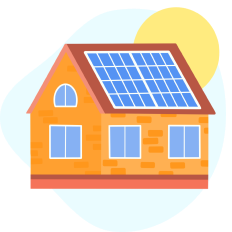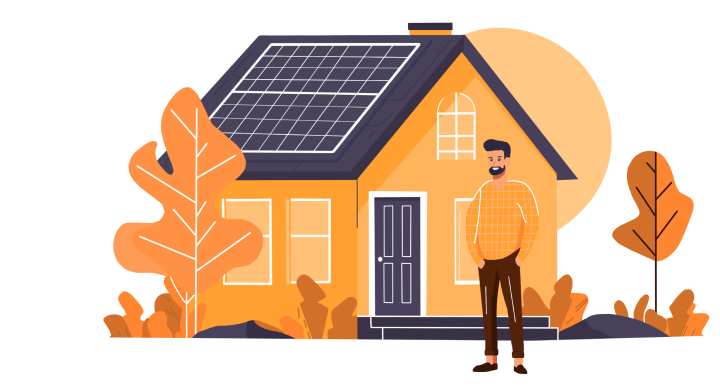Solar installation Texas services are gaining traction as residents seek sustainable energy solutions tailored to the state's unique climate. Texas, with its abundant sunshine and supportive solar tax credits and incentives, presents an ideal environment for harnessing solar power. However, navigating the process—from understanding local regulations to choosing the right home solar energy installer—can be daunting.
In this article, Solar Energy Host shows you how to choose the right provider among the top rated solar installers in your area. Our platform makes connecting to solar energy providers easy, eliminating the need to manually sift through all the Texas solar power companies out there.
Here's how to choose the best solar installation Texas has to offer you:
Step #1: Determine your solar needs based on your history of energy usage.
Energy consumption analysis
Your solar panel installation should meet the average energy consumption reflected in your past year's electricity bills.
Reviewing your electricity bills from the past year provides a reliable snapshot of your household's energy use patterns. It's essential to look at monthly variations to account for seasonal changes, like increased air conditioning use during the summer. This data will help you determine the capacity of the solar system needed to match your energy needs consistently throughout the year.
By closely aligning your solar installation Texas project with your historical energy usage, you pave the way for optimal efficiency and savings.
Roof space and orientation
Your roof must offer sufficient space, minimal shading, and appropriate orientation to maximize solar efficiency.
A roof with enough space and minimal shading ensures that your solar panels receive ample sunlight throughout the day. Ideal roofs should face south to capture the most sunlight, but east- or west-facing roofs may also work with slight efficiency trade-offs. Ensuring your roof's structural integrity is crucial too, as it must support the weight of the panels and endure weather conditions without issues.
Taking these factors into account when installing solar panels will help you achieve maximum solar panel performance and longevity.
Step #2: Evaluate the efficiency and durability of different solar panels.
Monocrystalline vs. polycrystalline solar panels
When choosing between monocrystalline and polycrystalline solar panels for your solar installation Texas home project, it's essential to consider both efficiency and durability, as these factors significantly impact your solar system's performance and longevity.
Monocrystalline panels typically offer higher efficiency and can generate more power per square foot. This makes them an excellent choice for homes with limited roof space, especially in places like Texas, where extreme weather can test their durability.
Polycrystalline panels, on the other hand, typically come at a lower solar panel installation cost. While they generally offer slightly less efficiency than monocrystalline panels, they are still a solid choice for homeowners looking to balance performance with affordability.
Ultimately, the decision between monocrystalline and polycrystalline panels will depend on your specific energy needs, budget, and available roof space, with each type offering distinct advantages.
Heat and storm resistance
Choose solar panels that are highly rated for heat resistance and storm durability.
Texas is known for its extreme weather conditions, from scorching summers to severe storms. Panels that are highly rated for heat resistance can maintain their efficiency even at high temperatures, preventing loss of power during the peak sun months.
Similarly, panels tested for storm durability can withstand high winds and heavy rainfall, ensuring that your investment remains intact through the many weather challenges Texas presents.
Step #3: Research local solar installers to find the most reliable service.
Certifications and licensing
Your chosen Texas renewable energy installer must hold current Texas certifications and proper licensing.
Having a professional solar panel installation provider with the right certifications and licenses ensures that they meet Texas's industry standards. These credentials often come from reputable industry bodies, which means the installer follows stringent quality and safety guidelines. Without these certifications, you risk falling victim to subpar workmanship, which can result in safety hazards or inefficient solar performance.
Connect with top local solar providers through Solar Energy Host.
You don't have to endlessly search for solar installation Texas-wide just to find the best solar installation companies—Solar Energy Host helps you do that with ease. Our intuitive platform lets you enter basic information, compare quotes and choose the best offer for your needs.
When you use our platform to consider your solar panel cost, you can get multiple quotes from reliable local providers, allowing you to compare and find the best fit for your needs. We transparently present the quotes, making it easier for you to understand the benefits of solar energy each one offers and get an estimate of what your solar installation cost will be.
Frequently Asked Questions (FAQ)
Do I need a home energy audit before installing solar panels in Texas?
It's not required, but a home energy audit may be ideal to optimize your solar installation Texas service.
While skipping the audit won't prevent you from installing solar panels, conducting one can reveal hidden issues that could affect your system's efficiency. An audit can identify areas in your home where energy is wasted, allowing you to make necessary adjustments before going solar.
This proactive approach ensures that your new solar installation works in harmony with your entire home's energy use, maximizing your long-term savings and minimizing the need for unnecessary solar panel maintenance.
What are the key factors to consider when comparing solar panel systems?
Key factors include panel efficiency, cost, warranty, type, and durability under local conditions.
Panel efficiency is crucial because it determines how much sunlight gets converted into usable energy, directly impacting your energy savings. The cost to install solar panels should be weighed against the benefits, including long-term savings and energy production. Additionally, the type of panel affects performance and durability, especially in Texas's hot and storm-prone environment.
Can solar panels be added to an existing home or only new constructions?
A solar installation Texas service can be done on both existing homes and new constructions, with structural support and sunlight exposure being critical considerations.
When installing solar panels on roof of an existing home, ensuring that your roof can support the additional weight and withstand various weather conditions is essential. For new constructions, solar can be incorporated into the design from the start, potentially saving costs and optimizing efficiency.
Switch to a sustainable future with Solar Energy Host
No need to figure out how to install solar panels on your own—let Solar Energy Host connect you with top local installers. Just enter your details, and you'll receive quotes from trusted providers on our platform. Save time and effort while making an informed decision with all the information you need right at your fingertips.
Get competitive quotes delivered to you today!




















